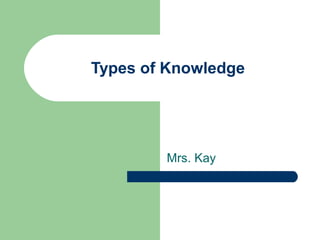
Types of knowledge
- 1. Types of Knowledge Mrs. Kay
- 2. EMPIRICAL KNOWLEDGE Knowledge gained using the primary senses – seeing, tasting, feeling, hearing or smelling. Sometimes instruments are used as aids to our senses. ex: the computer is black.
- 3. Revealed knowledge knowledge we accept on faith Ex: All living animals today are descended from those on board Noah’s Ark.
- 4. Authoritative Knowledge knowledge we gain from experts Ex: lawyers, doctors, people with credentials.
- 5. Rational Knowledge based on what are considered to be rational/ logical truths Ex: If x=y and y=z then x must equal z
- 6. Intuitive Knowledge knowledge possessed without knowing where it comes from. Ex: a mother instinctively knows when her baby is in need.
- 7. OBSERVATION Observations are always empirical. Qualitative observations involve simple descriptions. Ex: color Quantitative observations involve amounts/numbers. Ex: recording the temperature.
- 8. INTERPRETATION involve reasoning based on observations Included in the analysis section of a lab report Indirect form of knowledge that builds on a concept or an experience to further describe or explain an observation.
- 9. Observation or interpretation? Noticing light and heat from burning magnesium Observation The O2(g) molecules collide with magnesium atoms and electron removal causes the ions of magnesium and oxygen to form. Interpretation
- 10. Variables Scientists use an experiment to search for cause and effect relationships in nature Independent (x-axis): is a factor that is manipulated in an experiment. The experimenter controls whether or not subjects are exposed to the independent variable Dependent (y-axis): is measured to determine if the manipulation of the independent variable had any effect. Controlled: Property that is kept constant throughout an experiment.
- 11. Experiment: A certain mass of magnesium is burned and is compared to the mass of product formed. What is the… Responding: mass of product (we measure how much is left) Controlled: composition of air, initial temp., amount of air available… Manipulated: mass of magnesium (we decide how much is burned)
- 12. Scientific Law Statements of major concepts based on empirical knowledge Ex: the law of conservation of mass. In a phys. or chem. Change the initial mass = the final mass Generalization: statements that summarize a limited number of empirical results. More broad.
- 13. Questions Pg. 29 #1-3 (Nelson) Pg. 32 #7-8 Read pg. 43-45